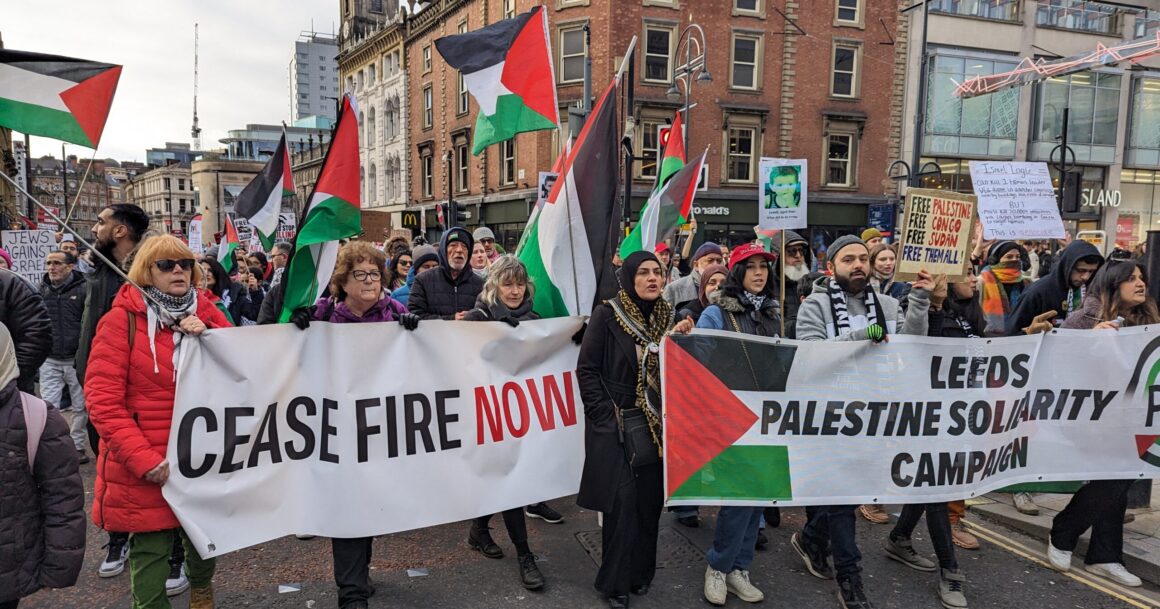

By Jeremy Dewar
FROM THE campaign against Israel’s war, our aim must be to create a vibrant anti-imperialist, anti-militarist movement. To sustain a movement after any ceasefire, we need to create democratic, decision-making assemblies which draw in representatives of the unions, workplaces, schools and universities.
‘15,000 women and children dead, Angela Rayner, women having to use scraps of tents for sanitary towels. Call yourself a feminist. I don’t think so.’ This intervention at a Labour Party rally in Rochdale last month sent the deputy leader scurrying away. It needs to be repeated up and down the country.
It is good that StW has called for a day of action on International Working Women’s Day. This ‘war’ of collective punishment has fallen hardest on the women and children of Gaza. Not only can women immediately empathise with their plight, they can also be the most powerful voices against oppression. We need an anti-militarist women’s movement, so women can take to the fore in opposition to this war.
Young people too have been in the lead when it comes to direct action. School students have forced headteachers to cancel ‘inspirational’ talks by BAE arms dealers and organised walkouts when Wes Streeting was invited to address them. They need to demand the right to discuss the conflict and to agitate for a just peace.
University students in Goldsmiths and Leeds have gone into occupation demanding divestment from Israeli firms, the right to free speech and education on Palestine and for funds to be made available to help students whose universities and libraries have been bombed to pieces. This must become the start of a wave of sit-ins and teach-ins.
Last but not least the workers need to discuss the war and what the unions should do—in their branches, workplaces or nearby cafes and pubs if need be. The 7 February day of workplace action was small, but a start. The solidarity work done around Elbit and BAE Systems has begun to reap results in terms of publicity, disruption and, most importantly, contacts.
But the problem is at the top of the unions, whose banners and resources have been markedly absent from demos, leaving only a few trades councils, left wing branches and workplace groups to march together—which they have started to do. Lindsey German in last month’s New Left Review excused the bureaucrats, claiming the trade unions’ ‘stance on this issue has generally been quite robust’, which clearly it hasn’t!
The truth is that the union leaders, after a very belated flurry of statements calling for a ceasefire, have refused to be drawn into the Gaza war out of political cowardice. They fear being accused of anti-Semitism and causing Labour’s election hopes further problems, which is on the top of almost all of their agendas. In some, like Unite, this has led to an undeclared ban on banners and speakers on the demos.
It is the task of the rank and file of the unions, many politicised during the strike wave, to fight for workers’ action against the genocide, to answer the Palestinian trade unions’ call to ‘refuse to build [or] transport weapons to Israel’, to ‘take action against complicit companies involved in implementing Israel’s brutal and illegal siege’’ and ‘pressure governments to stop all military trade with Israel’.
We need a network of rank and file militants, within and across unions and backed up from outside, to start to respond to this call for solidarity and that implies defying the anti-union laws. But if not to stop a genocide, when?
There are many other aspects that show promise and need encouragement—work among the racially oppressed and migrant communities, the emergence of anti-Zionist Jewish contingents. However, the StW rallies and, just as much, the SWP-run Organising Assemblies are in danger of cramping this creativity or directing it narrowly into big marches and boycotts of Barclays. Workers For a Free Palestine, an umbrella group of a wide spread of activist groups, has a superior model of direct action and open assemblies, focused on bringing the organised labour movement into action.
This model needs to be generalised by developing local democratically run councils of action that can bind the different strands of the movement into one and educate each other, while taking political decisions about the way forward. Then they can link up into regional and national forces. If we can do this, we can not only play our part in stopping this war, but prepare the ground to resist future wars.